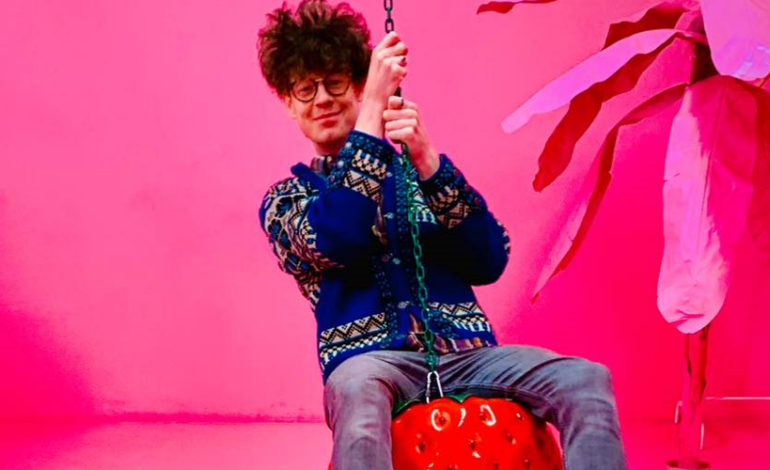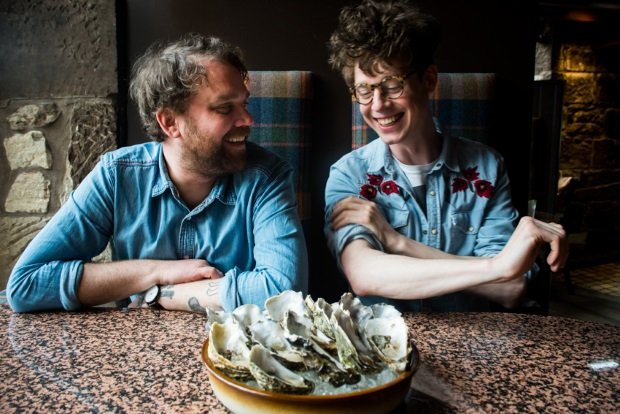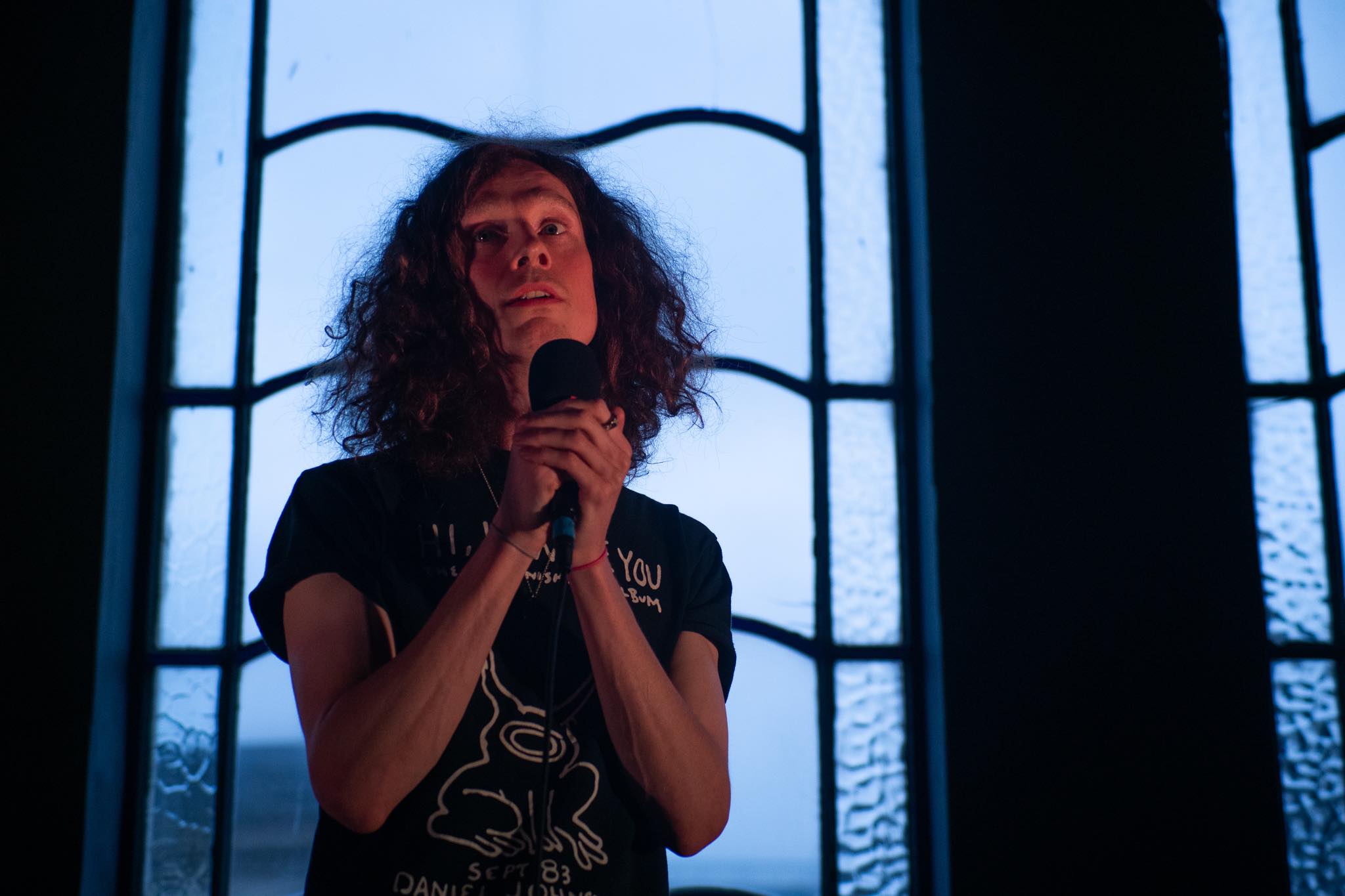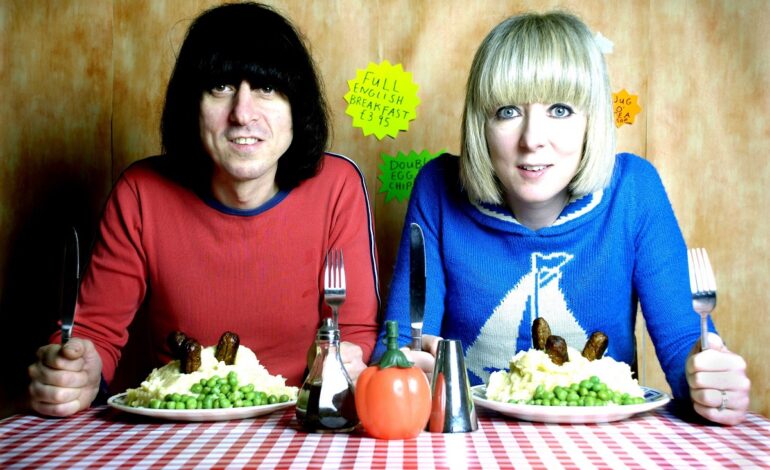
In summer 2017 Edinburgh poet Michael Pedersen published Oyster, his second collection of poetry. The pulsing heart-on-his-sleeve poems within were illustrated by dear friend Scott Hutchison in the witty and warmest of fashions. Scott, more well known for his band Frightened Rabbit, had studied Illustration at the Glasgow School of Art and as the two pals worked on Oyster they playfully imagined it to serve as an active passport, a way of adding to travels already enjoyed together. The book was a compass for the next stage of the pair’s friendship, if you like.
Scott died the following year, aborting plans. ‘It was our book, then it became my book with him in mind and no longer with us,’ reflects Michael, also co-founder of Scottish literary, music and animation collective Neu! Reekie! ‘Now, each time I read from it, it’s harking back to the most seminal creative endeavor of my life up until that point, with one of my favourite artists and one of my favourite humans. This next book is me trying to find a way to continue that narrative.’
The new book he refers to is Boy Friends, a memoir crafted in travel journal form brimful with affectionate recollections of not only his deep emotional connection with Scott but a myriad of male friendships past and present. It’s a tribute to platonic love, with Stephen Fry, Charlotte Church, the now Sir Ian Rankin, Kae Tempest, Jackie Kay, Shirley Manson, Val McDermid and too many to list declaring themselves smitten with the book.
Michael started writing Boy Friends soon after Scott’s death, a term he uses sparingly in its pages. I had to ask why.
‘I didn’t really want to use the vocabulary which would anchor his fate too much into the way he left rather than the way that he moved through this world. Words like ‘passing’ immediately hark back to the movement of what came before then. To the living that had been done,’ he says.

Initial writings later morphing into Boy Friends was done in a panicked fervour Michael found cathartic, cauterizing emotional wounds, as he puts it. Sitting down each day to record his beautiful and painful memories and his new life without Scott became an obsession he admits, or at least a crutch, giving purpose to his days. The fact is, nothing can prepare you for the death of a loved one. The brutal reality of it can be securely filed under something people don’t talk about in realistic terms.
‘It doesn’t matter how many grief memoirs or how much shrewd poetry or how much physical and mental preparation you do for it. When the moment comes it’s never going to be exactly as you imagined. Your body is this whole ocean of different chemicals, they collide together in a way that hopefully you’ve never felt before and will never feel again, as optimistic as that is.
‘There’s an ungodly animal howl, there’s a loss of breath…’ he recalls of the moment the phone call came informing him Scott had been found. ‘I could feel it as a physical sensation all over my body. I knew I wasn’t sleeping well. My mind was dancing all over the place. It was like trying to have a picnic on a waltzer ride. Everything was just flying everywhere.’
Scott produced substantial work with Frightened Rabbit alongside solo projects and collaborations. His audience still has a special bond with his songs, his expressions of vulnerability and honesty pulling them close. But when Scott went missing and afterwards, obituaries and social media posts made much reference to his song Floating in the Forth. There is a tendency to dramatize and romanticize the death of the famous or well known sometimes, and it felt from my perspective anyway as if Scott writing the song itself – about his darker thoughts but choosing light – and his exit from this world was regarded in some quarters, distastefully, as almost a piece of performance art.
‘Obviously I know that song and you can imagine what people would say but in terms of a self-fulfilling prophecy, that song was always the opposite to me. The song of someone that taken themselves to the emotional breech and decided to make a call for living. It was exploring the darkest avenues of the mind our sadness can take us down and deciding to live for another day.’
It’s a song of hope.
‘Yes. Yes, it is.’

Michael gave a reading in Liverpool last year, a poignant passage from Boy Friends recalling the final and pricey seafood meal he, Scott and Michael’s girlfriend fellow poet Hollie McNish shared. Throughout the book we are brought along with Michael, Scott and companions as if we are fellow travellers too. We go to wonderful places as food and wine is devoured; enjoy oysters all over the world from New York to South Africa to closer to home in Leith.
‘We often made sacrifices to get it whether financially or the time to eat it or the place you have to go to. There’s something sexy about food. There’s something romantic about food. There’s something mysterious about food. That ability to feast on delicious flavours with someone who’s themselves a delicious flavor to your life.’
I read a poem from Oyster at my husband’s funeral in 2019, I mention.
‘Was it a poem about love? Like giddy relishing emotionally high love?’ Michael asks. ‘If grief is the loving and missing them then it’s all about representing the love we had for these people when they’re no longer around. The gooeyness of love because that’s what you’re missing. Grief is a frustration. Of not being able to continue to love them.’
Yes indeed it was a true heart swell of a poem, and as I read those tender words in front of family and the lovely hospice chaplain I was unaware of the subtle yet definite phallus on its front cover drawn by Scott, his smutty schoolboy humour showing itself. It was reading Boy Friends alerted me to it. I searched out my copy of Oyster, and there it was, a penis right there on the front. It’s now the first thing my eyes search out when I pick it up, and it always makes me smile. No one knew of its presence for ages, an amused Michael tells me. Until Scott pointed it out at an event promoting the book.
‘It set a precedent, hiding little drawings all over the books we signed. Commonly page 69,’ Michael laughs. ‘For a time afterwards there’s be tweets “I found this in my copy of Oyster”. Scott’s kept popping up!’
Upon reading the book Stephen Fry commented how Michael and Scott were lucky to find one another, and we get a real sense of that in Boy Friends. It is is no misery-memoir, for sure. On the contrary; Michael imagines Scott’s mischievous reactions to happenings since and it’s because of him Boy Friends blooms beautifully, organically into a reflection and appreciation of many of Michael’s male friendships. The book acknowledges that a well-lived life of friendship and love can be as a series of vignettes; lengthy lifetime connections from primary school to death are not the only worthwhile bonds. People float in and out of our worlds. Paths diverge. We outgrow friends, our passions take us in different directions. Sometimes people are not good for us. And that’s ok. We can bid them farewell and still treasure and thank them for the times together. In Boy Friends we meet a myriad of characters, Michael examining friendships from boyhood, through university and a boisterous edgy life in London – he sugar-coats nothing – helped him put the loss of Scott into context.
‘It gave me the emotional apparatus to accept that I could still celebrate this friendship which reached the most brutal end. One I couldn’t get back in this life whether I wanted to or not,’ he says.
We have more friendships end when you think about it, he analyses, than any other relationship. There should not be a league table of loving. Love is love, the end of friendships denied a mourning period. In part because romantic love is seen as the most valid connection in adulthood. It’s interesting how friendships are focused on so heavily in literature when we are children then vanish or get watered down.
He nods. ‘As if “now you’re old enough to shag and fondle it’s all about romantic love, it’s what should be consuming you now”. The friendship narrative stops, it’s secondary. I see them all on the same gooey love-filled terrain.’
Female friendships seem to exist on a different plane, do they not; the level of physical affection between women and girls is not encouraged in the behaviours of men and boys. In the book Michael talks about approaching hand holding with male friends, how such contact is more often than not met with a what-are-you-doing shock and horror, or jokey exaggeration. He recalls envy growing up, girls linking arms, going on sleepovers. Activities not socially acceptable for boys to do with other boys.
‘I felt so bereft the warmth and closeness that brung. You get a lot of guys that have had very little physical contact then all of a sudden it’s just about mimicking something they’ve seen online, they’ve not brought themselves into this really warm nurturing place. It’s changing now and going across the world it’s more common for men to hold hands and embrace. What a difference that could make if that was part of our society, males comfortable with sensuality from a much younger age.’
What, does he reckon, would Scott think of the book? If he could read it now.
There’s a silence.
‘I don’t know,’ he says slowly. ‘I wouldn’t like to make any guesses on his behalf. All I’ve tried to do is portray this friendship exactly as it was. This huge sprawling burst of joy and silliness and smuttiness and emotionally fuelled conversations that shall bolster me up for the rest of my life.’
Scott Hutchison may not be physically on this planet any longer but he’s left us a lot to be going on with, the inspiration for Boy Friends just one element of this legacy. Michael reveals at the end of our conversation how the book has unexpectedly reinvigorated a lost friendship, a happy consequence he did not envisage. But of the others who remain safely in his past, he hopes to have done each one proud. He hopes all feel loved and it finds them in positive places in their lives. Boy Friends makes us cry and laugh and consider our own griefs and joys, those we have lost through death and life’s natural flows. Above all, it reminds us that bereaved and hurting hearts might be bruised and exhausted but can and will still beat, beat, beat – and love.
Boy Friends is published by Faber on 5 July. The Liverpool launch takes place the same day, with Hollie McNish, Withered Hand & Heidi Henders at Everyman Theatre Liverpool on 5 July as part of The Lovely Word festival.


